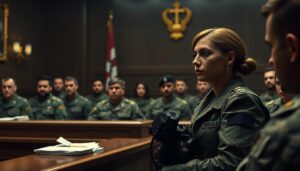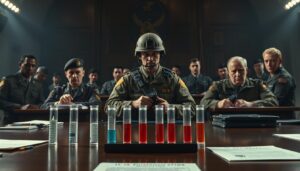In recent years, the military has taken significant strides in addressing sexual assault cases within its ranks, resulting in a complex web of legal proceedings under the Uniform Code of Military Justice (UCMJ). However, while the impetus to combat sexual violence is noble, the legal landscape is fraught with challenges—especially when it comes to memory and its implications in these emotionally charged cases. For military servicemembers, facing allegations of sexual assault can feel like navigating a minefield, not only due to the potential for severe penalties but also the unique psychological frameworks that can influence the perception of reality. This blog post seeks to unravel the intricate relationship between sexual assault and false memories in UCMJ cases, providing critical insights that every servicemember should be aware of as they defend their careers, reputations, and freedom.

Key Takeaways
- The UCMJ provides a legal framework for addressing sexual assault within the military.
- Understanding sexual assault requires context, including definitions and social factors.
- Memory plays a critical role in sexual assault cases, influencing how incidents are reported and perceived.
- False memories can complicate legal proceedings, posing challenges for both victims and defendants.
- Implementing effective strategies is essential for addressing false memories in UCMJ cases to ensure fair justice.
Introduction to UCMJ and Sexual Assault Cases
In the complex world of military law, few topics command as much attention and concern among servicemembers and their families as sexual assault allegations under the Uniform Code of Military Justice (UCMJ). These cases not only have serious implications for one’s military career and reputation but can also lead to significant and long-lasting consequences for all parties involved. The emotional weight of a sexual assault allegation is compounded by the nuances of memory, particularly the phenomenon of sexual assault and false memories in UCMJ cases. Recent studies suggest that the human brain can misinterpret or reconstruct memories, potentially leading to false accusations that damage lives and military careers. As a servicemember facing such allegations, it is crucial to understand the UCMJ‘s framework, the investigative procedures that follow, and the defenses available to you. This article aims to shed light on the intricacies of UCMJ sexual assault cases, the role of false memories, and the importance of seeking competent military defense lawyers to navigate these treacherous waters.
Understanding Sexual Assault: Definitions and Context
### Understanding Sexual Assault: Definitions and Context
Sexual assault is a term that carries a heavy load of legal and emotional implications within the military context, especially under the Uniform Code of Military Justice (UCMJ). The Department of Defense (DoD) defines sexual assault as a crime consisting of intentional sexual contact, characterized by the use of force, threats, intimidation, or when the victim is unable to consent. In UCMJ terms, this includes various offenses, categorized primarily under Article 120, such as rape, sexual assault, and aggravated sexual contact.
However, the complexities of such allegations also encompass the controversial topic of sexual assault and false memories in UCMJ cases. False memories, a psychological phenomenon where individuals recall events that did not occur or recall them incorrectly, can arise in the context of traumatic scenarios. Research suggests that stress, suggestion, and misinformation can influence a person’s recollection of events. This truth can complicate cases where military members are accused of sexual assault. Accusers may genuinely believe in the veracity of their statements due to these memory distortions, posing a substantial challenge for defendants who must navigate a system that often places significant weight on the perceived credibility of the accuser’s account.
Understanding this psychological landscape is vital for military personnel facing allegations, as it underscores the importance of legal representation by seasoned military attorneys who can adeptly handle the nuances of such cases. If you’re confronted with accusations that may be influenced by false memories or any other misconstrued elements, it is essential to seek advice from a military defense lawyer equipped with the knowledge and expertise to advocate effectively on your behalf. Reputable civilian defense lawyers can assist in debunking misunderstandings and striving for a just outcome in these emotionally charged cases.
‘Memory is deceptive because it is colored by our imagination and our expectations.’ – Walter Lippmann
The Role of Memory in Sexual Assault Cases
In the context of military sexual assault cases under the UCMJ, the role of memory can significantly influence the outcome of investigations and legal proceedings. Recent studies have revealed that memory is not as reliable as many believe, especially in high-stress situations like those involving sexual offenses. Factors such as trauma, stress, and the passage of time can lead to sexual assault and false memories in UCMJ cases, presenting challenges for both the accused and the accuser. For instance, a victim’s traumatic recollections may be vivid but not entirely accurate, potentially leading to wrongful allegations. Consequently, understanding how memory works—and how it can be manipulated or distorted—becomes crucial for military servicemembers and their legal counsel. It is vital to seek the guidance of skilled military attorneys who can navigate these complexities to ensure that the rights of the accused are adequately defended while maintaining sensitivity towards the experiences of victims.
False Memories: Psychological Insights
### False Memories: Psychological Insights
In the complex landscape of military justice, particularly when it comes to allegations of sexual assault and false memories in UCMJ cases, understanding the psychological factors at play is crucial. Numerous studies highlight that false memories can occur in high-pressure situations, often leading to tragic consequences for involved servicemembers. For instance, according to a report from the Department of Justice, 22% of those who provided testimony in judicial settings expressed doubts about their accuracy due to stress or trauma at the time of the incident.
False memories can emerge when a person misremembers details or events, sometimes amalgamating real experiences with suggestions from external sources. This phenomenon can significantly impact UCMJ proceedings, especially in allegations of sexual assault where emotions run high.
Combat veterans or service members who have experienced trauma may inadvertently create false memories when recalling an event, particularly if interrogated multiple times or exposed to biased narratives. This not only complicates investigations but also raises questions about the integrity of testimonies and evidence presented during trials, including court-martials.
For servicemembers facing such accusations, the presence of false memories can alter the course of their defense strategy. It underscores the importance of hiring experienced military attorneys who understand how to navigate these psychological complexities. In legal reopenings of sexual assault cases, a well-versed military defense lawyer can challenge the reliability of witness testimonies, presenting psychological insights effectively.
In conclusion, the intersection of psychology and law in UCMJ cases involving accusations of sexual assault demands a nuanced understanding of how false memories can distort reality. As awareness grows, so does the responsibility for military legal representatives to safeguard the rights of accused servicemembers, ensuring fair treatment in the pursuit of justice.
Legal Implications of False Memories in UCMJ Proceedings
### Legal Implications of False Memories in UCMJ Proceedings
In military justice, particularly under the Uniform Code of Military Justice (UCMJ), accusations of sexual assault can have devastating impacts on the accused, their careers, and their personal lives. A growing body of research highlights the phenomenon of false memories and how they can complicate UCMJ cases. False memories can arise from various factors, including leading questions during interviews, media coverage, or the influence of peers. This raises significant legal implications regarding the reliability of witness testimony and the integrity of investigations.
Military servicemembers facing allegations need to understand how false memories can affect their cases, especially since sexual assault and false memories in UCMJ cases can lead to wrongful accusations and unjust punishments. For example, if a witness claims to have seen or heard something specific but later insists on those details without clarity, they could be recalling a memory that was altered or inaccurately constructed over time. Such situations can create challenges for court martial attorneys defending clients against sexual assault allegations. Understanding this aspect allows military attorneys to craft more robust defenses, questioning the credibility of the accuser’s memories and the context in which those memories were formed.
If faced with such allegations, it is crucial for servicemembers to engage a seasoned civilian defense lawyer who specializes in UCMJ cases. These attorneys can analyze the nuances of how false memories could play a role in the accuser’s testimony, thereby strengthening the defense strategy. By employing techniques that highlight inconsistencies and potential memory distortions, legal representation can effectively advocate for the accused, ultimately seeking to protect their career, reputation, and freedom.
Case Studies: Analyzing Real UCMJ Cases
### Case Studies: Analyzing Real UCMJ Cases
In the military justice system, cases involving sexual assault are among the most serious and complex. In recent years, there has been a growing concern regarding the phenomenon of sexual assault and false memories in UCMJ cases. Understanding this issue is crucial not only for those directly involved in such allegations but also for the military community as a whole.
Take, for instance, the case of a female servicemember who accused her fellow soldier of sexual assault. The incident occurred after a night out with peers, leading to doubts about the credibility of the event, given that both parties had consumed alcohol. While the initial accusation brought immediate attention from the command and law enforcement, the accused soldier sought the help of military defense lawyers to navigate the complexities of the UCMJ.
As the investigation unfolded, crucial aspects emerged regarding the phenomenon of false memories. Multiple studies have shown that individuals can create vivid but incorrect memories, particularly in emotionally charged situations. In this case, as the accused soldier’s attorneys reviewed the evidence, discrepancies arose between the testimonies of the accuser and witnesses. This highlighted the potential for memory distortion and its significance in UCMJ proceedings.
Another noteworthy case that illustrates the complexities of false memories in military sexual assault allegations involves a servicemember who was accused of assaulting a colleague during a training exercise. Initially, the accuser detailed a traumatic experience; however, as the investigation progressed, inconsistencies appeared in the timeline of events and the nature of the encounter. Military attorneys representing the accused soldier effectively highlighted these inconsistencies, showcasing how stress and the pressure of the situation might have led the accuser to misremember details, which is common in traumatic situations.
These case studies underline the imperative of having proficient military defense lawyers who can recognize and utilize the effects of false memories in building a defense. Comprehensive legal representation is essential, as military attorneys with experience in dealing with UCMJ sexual assault cases can navigate these intricacies effectively, ultimately protecting the rights and careers of servicemembers involved in such serious allegations.
In conclusion, the interplay between sexual assault allegations and false memories can dramatically impact UCMJ cases. It is critical for both accusers and the accused to understand the psychological aspects at play. If you or someone you know is involved in such allegations, seeking a capable civilian defense lawyer with experience in military law is crucial to ensuring that justice is served.
Strategies for Addressing False Memories in Legal Settings
In recent years, the legal landscape has increasingly recognized the complexities surrounding sexual assault and false memories in UCMJ cases. False memories can arise from various factors, including leading questions during interviews, stress, and the mere passage of time. These factors can significantly impact both the testimonies of victims and the accused, leading to distorted recollections of events and affecting the outcomes of military justice proceedings.
### Understanding False Memories
False memories are recollections of events that either did not occur or are significantly distorted. Research in psychology has shown that memories are not as reliable as once believed—they can be influenced by external cues and the environments in which they are recalled. For military servicemembers facing allegations of sexual assault, understanding how false memories can be manufactured or implanted is crucial.
### Strategies for Addressing False Memories in UCMJ Cases
1. Documentation and Evidence Gathering: The first line of defense for anyone facing allegations is thorough documentation. While preparing your defense, gather any evidence that could corroborate your statements—this may include emails, text messages, witness statements, and timelines. Having solid proof can counteract misleading testimonies shaped by false memories.
2. Expert Testimony: Engaging a psychological expert familiar with false memory research can be instrumental in court martial proceedings. These experts can explain to the court how false memories form and the psychology behind them, offering context to the accusations.
3. Challenging the Evidence: Your military defense lawyer should scrutinize the methods used to collect testimonies. If coercive or suggestive techniques were employed in the investigation, this could undermine the reliability of the accusations. Pointing out such flaws may cast doubt on the evidence against you.
4. Pre-Trial Investigations: Leverage the pre-trial phase to gather more information about the circumstances of the allegation. This can help reveal inconsistencies in the testimonies of witnesses and the accuser, which may indicate reliance on flawed memories.
5. Cross-Examination Techniques: During the actual court martial, effective cross-examination can reveal inconsistencies in testimonies. Your military attorneys must be adept at utilizing techniques that highlight the potential for false memories, leading the court to question the reliability of certain statements.
6. Character Witnesses: Present character witnesses who can vouch for your integrity and behavior. This can create a context in which the court sees inconsistencies in the accuser’s narrative more clearly.
By employing these strategies, servicemembers can combat the implications of false memories in sexual assault allegations, safeguarding their reputation and career within the military. It is crucial to work with experienced court martial attorneys who understand these complexities and can tailor a defense that addresses these unique challenges.
Frequently Asked Questions
What is the UCMJ and why is it important in sexual assault cases?
The Uniform Code of Military Justice (UCMJ) is a set of laws that govern the conduct of service members in the United States Armed Forces. It is important in sexual assault cases because it provides a legal framework for prosecuting these offenses within the military justice system.
What are false memories and how can they impact sexual assault cases?
False memories refer to recollections of events that did not actually occur or are distorted. In sexual assault cases, false memories can impact the reliability of witness testimonies and complicate the prosecution and defense strategies.
What psychological factors contribute to the formation of false memories?
Psychological factors that contribute to false memories can include leading questions, suggestion from others, emotional stress, and the passage of time. These elements can alter an individual’s recollection of events, leading to inaccuracies.
How do false memories affect legal proceedings under the UCMJ?
False memories can lead to challenges in the evidentiary value of testimonies, potentially influencing jury decisions and the outcome of trials. They pose significant legal implications, particularly regarding the credibility of witnesses and the defense’s ability to challenge accusations.
What strategies are suggested for addressing false memories in UCMJ cases?
Strategies include comprehensive training for legal practitioners on the psychology of memory, utilizing expert witnesses in psychology during trial, and implementing rigorous protocols for interviewing witnesses to minimize suggestion and misinformation.






